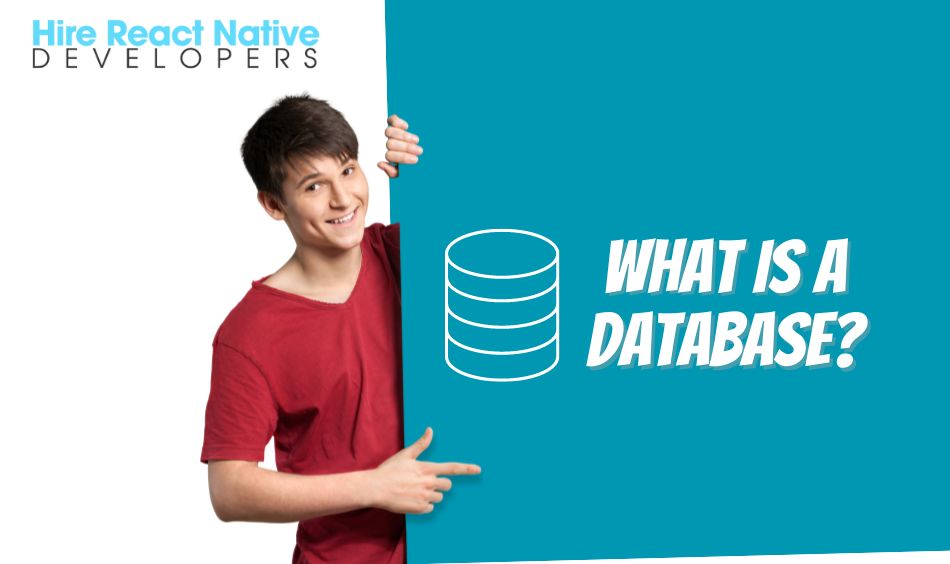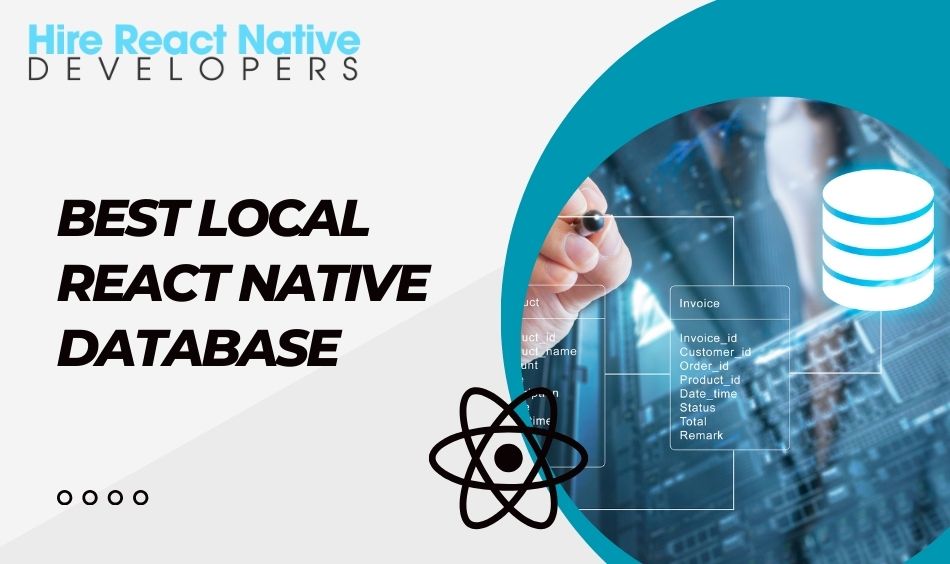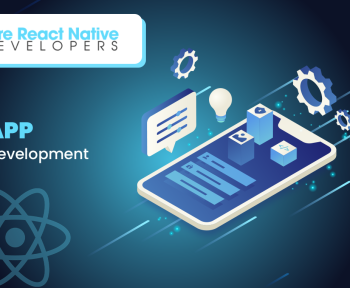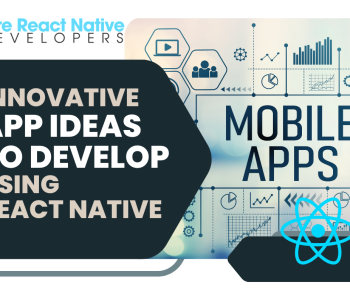In the rapidly advancing field of app development, selecting the appropriate database is a key decision that can significantly influence the performance and scalability of your React Native application. React Native, renowned for its efficiency in building cross-platform apps, relies heavily on the underlying database to manage and store data effectively. The right database choice not only impacts how data is handled but also affects the overall user experience and application functionality. This blog aims to guide you through understanding different types of databases, their characteristics, and how to select the best one for your React Native app development needs.
What is a Database?

A database is an organized system for storing, managing, and retrieving data. It is a critical component of modern mobile app development, providing a structured way to handle information such as user data, app settings, and other relevant content. Databases enable efficient data manipulation, support concurrent access, and ensure data consistency and integrity. They can be classified into relational and non-relational types, each suited to different application needs and data management requirements.
Relational databases structure data into tables with predefined schemas, making them ideal for applications with complex queries and transactional requirements. Non-relational databases, on the other hand, offer more flexibility in how data is stored and accessed, often accommodating larger volumes of unstructured data and supporting high scalability.
Types of Database
Databases fall into two main categories: local and server-side. Each type serves distinct purposes and is suited to different aspects of application development.
Local Databases : Local databases are integrated directly into the application and are stored on the user’s device. They are beneficial for applications that need to operate offline or require quick data access without relying on network connectivity. Local databases offer several advantages, including faster data retrieval and the ability to function without an active internet connection. They are often used for storing user preferences, session data, or other localized information.
Server-Side Databases : Server-side databases are hosted on remote servers and accessed over a network. They are designed to handle large volumes of data and support multiple concurrent users. Server-side databases are ideal for applications requiring centralized data management, scalability, and the ability to perform complex queries and transactions. They are commonly used for storing and managing data that needs to be accessed or updated from various locations and devices.
Best Local React Native Database

Firebase
Firebase, developed by Google, offers a real-time NoSQL database ideal for mobile and web applications. It provides cloud-hosted data storage that synchronizes across clients instantly, making it perfect for apps that need live updates and interactive features. Firebase’s integration with other Google services, such as authentication and analytics, streamlines the development process and supports a wide range of application requirements.
Key Features:
- Real-Time Synchronization: Updates are propagated to all connected clients instantly, ensuring that users always see the latest data.
- Offline Capabilities: Local data storage allows continued app functionality even when offline, with automatic syncing once connectivity is restored.
- Scalability: Designed to handle large amounts of data and high traffic without performance issues.
- Integration: Works well with other Firebase services, reducing the need for additional third-party solutions.
Security:
- Firebase includes customizable security rules to control data access, ensuring that only authorized users can read or write data.
- Built-in authentication options, including email/password and OAuth, help secure user accounts and data.
Benefits:
- Immediate updates and interactive features enhance user experience.
- Offline functionality keeps the app operational even without internet access.
- Scalable architecture supports growing user bases and data volume.
- Integrated services simplify development and reduce dependency on external tools.
SQLite
SQLite is an embedded SQL database engine that operates without requiring a separate server. It stores data in a single file, making it easy to manage and access. Its simplicity and efficiency make it a preferred choice for mobile applications that need a lightweight database solution.
Key Features:
- Serverless: Operates within the application, removing the need for a separate database server.
- ACID Compliance: Supports transactions with full atomicity, consistency, isolation, and durability, ensuring data integrity.
- SQL Interface: Provides a full SQL implementation for complex queries and data manipulation.
- Lightweight: Minimal resource requirements make it suitable for mobile devices with limited capacity.
Security:
- Encryption extensions are available to secure data at rest.
- Application-level security measures are necessary for sensitive information.
Benefits:
- Provides a complete SQL interface for managing data, allowing for sophisticated queries and interactions.
- Self-contained nature reduces dependencies and simplifies deployment.
- Efficient use of resources ensures good performance on mobile devices.
- Reliable data management through ACID compliance ensures data integrity.
Realm
Realm is a mobile-first database that uses an object-oriented approach for data management. It offers high performance and real-time data synchronization, which is beneficial for applications needing collaborative features or live updates. Realm’s integration with mobile platforms simplifies data handling.
Key Features:
- Object-Oriented: Uses native objects, making data management intuitive and reducing the need for complex transformations.
- High Performance: Optimized for fast data access and manipulation.
- Real-Time Synchronization: Data is updated across devices in real time, supporting collaborative applications.
- Easy Integration: Straightforward API for integration with mobile applications.
Security:
- Encryption is provided for data stored on the device, protecting sensitive information.
- Access control features help manage permissions and secure data.
Benefits:
- Object-oriented data model simplifies integration with application data structures.
- High-performance capabilities ensure quick data access and responsiveness.
- Real-time synchronization keeps data consistent across devices.
- Integration with mobile applications is streamlined, reducing development complexity.
PouchDB
PouchDB is an open-source JavaScript database designed for offline-first applications. It enables local data storage and synchronization with a remote CouchDB server, ensuring that applications function without internet access and synchronize data when online.
Key Features:
- Offline-First: Local data storage with synchronization to a remote server when connectivity is available.
- CouchDB Compatibility: Syncs with CouchDB for remote storage and replication.
- JavaScript-Based: Designed for integration with JavaScript applications.
- Lightweight: Efficient and easy to use for managing small to medium-sized datasets.
Security:
- Basic security provided through CouchDB synchronization; additional encryption and protection measures may be necessary for sensitive data.
- Developers need to implement appropriate security practices as required.
Benefits:
- Offline functionality ensures continuous app usage even when not connected to the internet.
- Synchronization with CouchDB offers a consistent remote backup and data store.
- Simple integration with JavaScript-based applications simplifies development.
- Lightweight design makes it suitable for applications with moderate data needs.
AsyncStorage
AsyncStorage is a basic key-value storage system available in React Native. It is designed for storing simple data such as user preferences or session information, using asynchronous operations to improve app performance.
Key Features:
- Key-Value Storage: Manages data as key-value pairs for straightforward data handling.
- Asynchronous Operations: Non-blocking reads and writes enhance performance and responsiveness.
- Built-in: Integrated within React Native, offering easy access for developers.
Security:
- Basic storage capabilities without advanced security features; additional encryption should be implemented for sensitive data.
- Developers should take care to secure data as needed.
Benefits:
- Ideal for storing small amounts of non-sensitive data, such as settings or session details.
- Asynchronous operations ensure that data management does not affect app performance.
- Simple integration with React Native applications minimizes setup time.
- Suitable for basic storage needs without complex requirements.
Watermelon DB
Watermelon DB is a high-performance database designed specifically for React Native and web applications. It supports large datasets and offline access, and features a reactive API that automatically updates the user interface in response to data changes.
Key Features:
- High Performance: Efficiently manages large datasets with minimal latency.
- Offline Access: Allows users to interact with data even when offline, syncing changes when connectivity is restored.
- Reactive API: Automatically updates the user interface in response to data changes.
- Integration: Works well with React Native and web applications.
Security:
- Basic security features included; additional encryption and access control measures are recommended based on data sensitivity.
- Developers need to ensure data protection through appropriate practices.
Benefits:
- Handles large amounts of data efficiently, providing smooth performance.
- Offline access keeps the application functional without a network connection.
- Reactive API simplifies data handling by automatically updating the UI.
- Easy to integrate with React Native and web platforms, facilitating development.
Also read : Guide to Improve Security in Your React Native Applications
Vasern
Vasern is a lightweight in-memory database for React Native applications. It is designed for simplicity and quick integration, making it suitable for small to medium-sized applications that require fast data access and manipulation.
Key Features:
- In-Memory Storage: Stores data in memory for rapid access and updates.
- Lightweight: Minimal impact on app performance and device resources.
- Simple API: Provides an easy-to-use interface for managing data.
- Quick Integration: Simple setup process for React Native applications.
Security:
- Basic security features; additional encryption and protection should be considered for sensitive data.
- Developers are responsible for implementing necessary security measures.
Benefits:
- Fast data access with in-memory storage improves app performance.
- Lightweight design reduces resource usage and ensures efficiency.
- Easy integration with React Native applications supports rapid development.
- Ideal for smaller applications or prototypes where simplicity and speed are priorities.
Best Server-side React Native Database
MySQL
MySQL is a widely-used relational database management system known for its dependability and versatility. It supports a range of applications from small web projects to large enterprise systems, offering structured data management and complex querying capabilities.
Key Features:
- Relational Database: Organizes data into tables with relationships, supporting complex queries and transactions.
- SQL Support: Full support for SQL, allowing detailed data manipulation and retrieval.
- Scalability: Handles high volumes of data and user traffic, with options for replication and clustering to improve performance.
- Open-Source: Free to use with extensive community support and contributions.
Security:
- Includes features such as user authentication, data encryption, and access control to protect data.
- Regular updates address security vulnerabilities and enhance protection.
Benefits:
- Reliable management of structured data with complex querying capabilities.
- Scalable architecture supports growth and high traffic without performance degradation.
- Open-source nature provides cost-effective solutions and access to community resources.
- Advanced security features help safeguard data and ensure compliance with best practices.
MongoDB Realm
MongoDB Realm combines MongoDB’s NoSQL database with serverless and real-time synchronization features. It offers a scalable and flexible solution for mobile and web applications, with built-in support for offline access and automatic syncing.
Key Features:
- Serverless: Managed by MongoDB, removing the need for server management.
- Real-Time Sync: Synchronizes data across devices in real-time for collaborative applications.
- Flexible Schema: Supports dynamic data structures, adapting to changing application needs.
- Integration: Works seamlessly with MongoDB, providing a unified data management experience.
Security:
- Data is encrypted both at rest and in transit.
- Access control features help manage permissions and protect sensitive information.
Benefits:
- Simplifies database management with a serverless model, reducing operational overhead.
- Real-time synchronization ensures consistent data across devices.
- Flexible schema accommodates evolving data requirements.
- Integration with MongoDB offers a comprehensive data management solution.
PostgreSQL
PostgreSQL is an advanced open-source relational database system known for its rich feature set and extensibility. It supports a variety of applications, from small-scale projects to large-scale enterprise solutions, with powerful SQL capabilities and customization options.
Key Features:
- Advanced SQL Support: Full SQL compliance with additional features such as custom data types and advanced indexing.
- Extensibility: Allows for the addition of plugins and extensions to extend functionality.
- ACID Compliance: Ensures reliable transactions and data integrity.
- Open-Source: Free to use with a strong community for support and development.
Security:
- Includes data encryption, user authentication, and access control.
- Regular updates and patches to address security issues.
Benefits:
- Supports complex queries and data management needs with advanced SQL capabilities.
- Customizable through extensions, allowing for specific functionalities.
- Ensures data integrity with ACID compliance.
- Open-source nature provides cost-effective solutions and community support.
AWS DynamoDB
AWS DynamoDB is a fully managed NoSQL database service designed to handle high performance and scalability requirements. It efficiently manages large datasets and fluctuating workloads, offering low-latency access and seamless integration with AWS services.
Key Features:
- Fully Managed: No infrastructure management required, with automatic scaling and maintenance.
- High Performance: Fast data access and processing capabilities.
- Scalability: Automatically adjusts capacity to meet performance and storage needs.
- Integration: Works with AWS services, providing a unified cloud solution.
Security:
- Includes encryption for data at rest and in transit.
- Fine-grained access control through AWS IAM ensures secure data management.
Benefits:
- Simplifies database management with a fully managed service.
- Provides high performance and scalability to meet diverse application needs.
- Fast data access supports real-time processing and quick responses.
- Integration with AWS services streamlines development and operations.
Also read : Step-by-Step Guide to React Native IoT App Development
Points To Consider While Finding the Best React Native Database
- Data Complexity and Structure : Select a database that matches the complexity and structure of your data. Relational databases are ideal for complex, structured data, while NoSQL databases are better for flexible data models.
- Offline Capabilities : For applications that need to work offline, choose a database with local storage and synchronization features to update data when back online.
- Performance Requirements : Look for databases that offer high performance with fast data access and processing, especially if your app handles high traffic or requires real-time data.
- Scalability : Pick a database that can expand with your app’s growth, handling increased data and user load without compromising performance.
- Security : Check for essential security features like data encryption, access control, and secure authentication to protect user data and maintain privacy.
- Integration with Other Services : Choose a database that integrates easily with other tools and services you use, helping to simplify development and minimize the need for extra solutions.
- Ease of Use and Learning Curve : Opt for a database that is user-friendly, with good documentation and active community support to streamline development and troubleshooting.
- Cost : Consider the total cost of the database, including initial setup and ongoing expenses. Compare free and open-source options with commercial solutions to find one that fits your budget.
Conclusion
Selecting the right database for your React Native application is crucial for its performance, scalability, and user experience. By considering factors such as data complexity, offline capabilities, performance needs, scalability, security, integration, ease of use, and cost, you can make an informed choice that aligns with your application’s requirements. A well-chosen database will support your app’s functionality and growth, providing a solid foundation for its success.
For businesses looking to develop or upgrade their React Native applications, partnering with experienced professionals is essential. Shiv Technolabs, with its team of skilled React Native app developers, offers the expertise needed to select and implement the best database solutions tailored to your needs. Whether you need custom development, integration, or support, Shiv Technolabs can help you achieve your goals efficiently and effectively.




